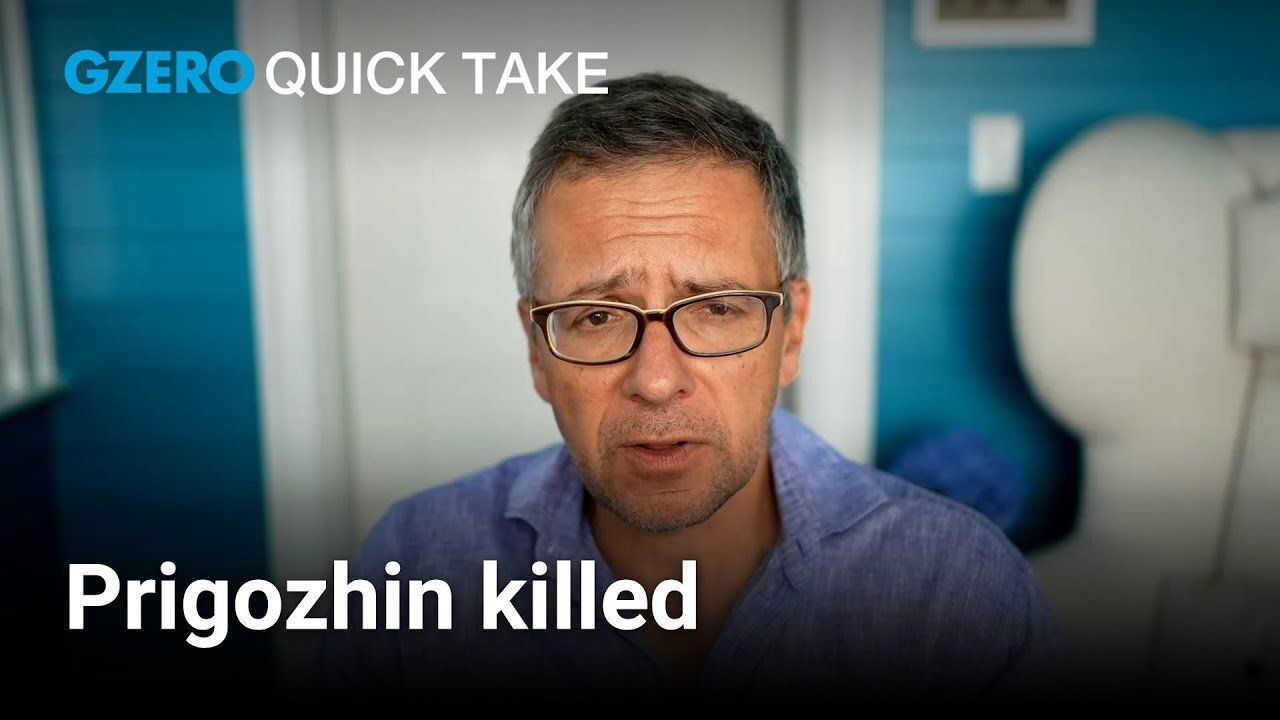August 23, 2023
Ian Bremmer's Quick Take: Yevgeny Prigozhin, former head of Wagner Group and would-be putschist against Vladimir Putin's Kremlin and Russia, is no more. It was an unprecedented story, that coup attempt against Putin's regime. This was the man who, of course, had been built up and so loyal to Vladimir Putin with the most powerful paramilitary organization in the world, fighting a battle on the ground in Ukraine and fighting against the Minister of Defense and others, losing that battle and deciding to turn his forces against the Russian regime. First, in Rostov and capturing the seat of the Southern command, and then marching him probably on to Moscow, where at the final moment he backs down and agrees to a quote unquote deal with Putin. Putin, who went on national media and referred to Prigozhin as a traitor.
Let's be clear, the important information from all of this was not that there was a deal that was cut. The important information that NATO is paying very close attention to is that Putin didn't take Prigozhin out immediately. He contained the threat. He took his time and acted in a much more calculated way for Putin's own survival.
And given that we've never seen Putin tested like this, and given that for a dictator, it's important to have some air of unpredictability, that you might just launch those weapons, you might have your finger on the button, and that creates some deterrence. The fact is that when Putin was faced with a truly regime-ending threat, that what he did was very careful, very calculated, and ensured the best possible ability for Putin to keep on keeping on.
Now, as I said, back in June, Prigozhin was a dead man walking. Putin had good reason not to want to take him out at the point of his maximum leverage, not least because it would be very ugly in and around Moscow. It would lead to a lot of people getting killed that you wouldn't be able to contain or not show the Russian public. It quite probably would've showed that Putin himself had fled to St. Petersburg from Moscow, a message that certainly he didn't want to see go out.
And of course, Russia was also fighting what was at that point expected to be a very difficult and dangerous Ukrainian counteroffensive. And opening up a fight on two fronts and taking troops away from Ukraine also would've made that much harder for him. So now, Wagner has been contained. Their media company has been shut, many of their bank accounts were frozen, their contracts are being transferred, and the Ukrainian counteroffensive has mostly been shut down by the Russians.
And that of course makes it far, far safer and easier for Putin to go after the former Wagner chief. And so now Yevgeny Prigozhin and the military command structure of Wagner, that leadership dead in a plane crash. I'm fairly comfortable, even though there is no direct evidence at this point, we probably will never have any, saying that Putin gave that order personally. And hey, he actually had some time on his hands since he can't exactly travel to the BRICS Summit in South Africa.
And I'm also comfortable saying that there's no strong near-term threat to Putin. Let's remember that even when the Wagner forces were on their way to Moscow, that there were no defections from Russia's official military structure, no defections from oligarchs. And of course there was not major instability among the Russian people on the streets.
Yes, of course the Russian economy is doing a lot worse now than it was six months ago, a year ago. But Putin still runs that place, and as everyone in Russia can now clearly see, there remain very serious consequences for taking him on.
That's it for me, and I'll talk to y'all real soon.
From Your Site Articles
More For You
Ukraine's President Volodymyr Zelenskiy, Finland's President Alexander Stubb, Estonia’s Prime Minister, President of the European Commission Ursula von der Leyen and other European leaders visit memorial to fallen Ukrainian defenders at the Independent Square on the fourth anniversary of Russia's full-scale invasion, in Kyiv, Ukraine February 24, 2026.
Ukrainian Presidential Press Service/Handout via REUTERS
Somewhere in the Donbas region, Ukrainian soldier Artem Bondarenko says he hasn’t slept through the night in months as he defends Eastern Ukraine.
Most Popular
Members of the special units of the National Guard and the Secretaria de Seguridad Ciudadana stand guard in front of the Fiscalia General de la Republica, where the investigation into the operation in which Nemesio Oseguera Cervantes, alias "El Mencho", founder and leading head of the Cartel de Jalisco Nueva, was killed, is underway.
Félix Márquez/dpa via Reuters Connect
- YouTube
In this Quick Take, Ian Bremmer warns that US military strikes on Iran are “looking increasingly imminent” as diplomacy appears to stall.
© 2025 GZERO Media. All Rights Reserved | A Eurasia Group media company.
